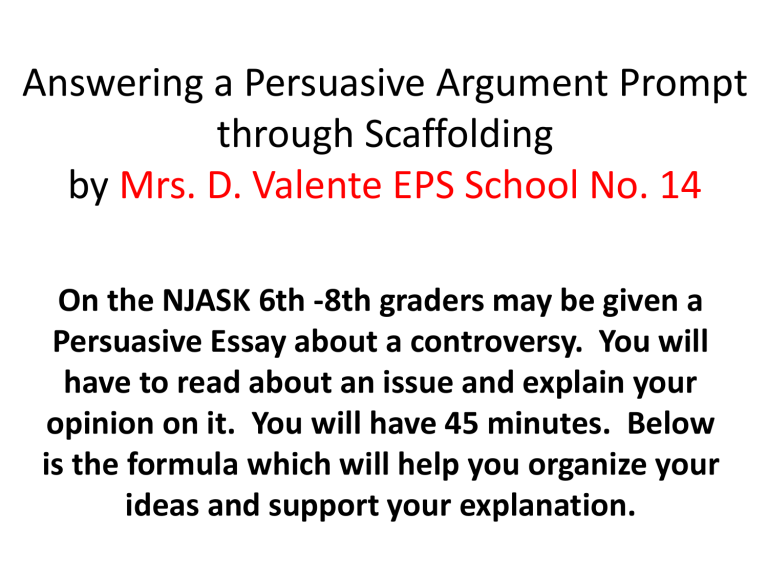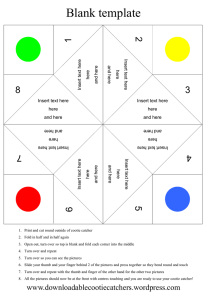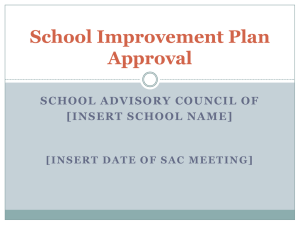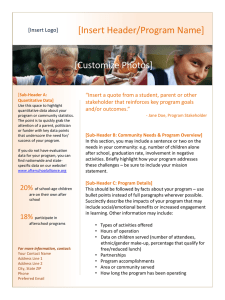File - Mrs. Valente`s LAL Class

Answering a Persuasive Argument Prompt through Scaffolding by Mrs. D. Valente EPS School No. 14
On the NJASK 6th -8th graders may be given a
Persuasive Essay about a controversy. You will have to read about an issue and explain your opinion on it. You will have 45 minutes. Below is the formula which will help you organize your ideas and support your explanation.
How to use my notes:
What you see in red [ ] are directions for writing. What you see in black are examples and where you write your own thoughts.
Sample Argument Writing Prompt Grades 6-8
• WRITING SITUATION
• Educational researchers claim that student learning will improve if all printed textbooks are replaced with electronic textbooks, known as e-textbooks. Based on the researchers’ findings, students in your school will be issued an e-textbook reader, which is a device that displays electronic books.
• WRITING TASK
• Write an essay either supporting or opposing the claim that student learning will improve if all student textbooks are replaced with electronic reading books. Use your knowledge and your own experience or observation to develop your essay. Use reasons, facts, examples and/or other evidence to support your position. www.nj.gov/education/assessment/es/njas k/NJASK13.pdf
Introduction Paragraph
(indent—–>) It has been stated, _______ OR
Imagine_______.
[insert a hook i.e. question/fact
/figurative language] [Restate the problem] This controversial issue means______________ [explain what the problem means].
This problem may affect
______ [insert person/people it affects and how it may affects others].
This is why I (support/oppose)
_________________. [State your opinion] First of all,
________. Secondly, _______. Finally,__________.
[Insert your 3 Main reasons] People may have a different opinion but I shall prove otherwise in this essay. Allow me to explain further.
2 Body Paragraph
(indent—–>) First and foremost, ___________.
[insert Main Reason 1] [Explain your reason in detail] Did you know _______? [insert Statistic] .
An example/fact that demonstrates this is true________.
[Add 2-3 details based on a credible/ trusting person or event that prove your reason is true].
Some may argue _______. [insert counter argument-an idea that is contrary to your reason] However, ______. [insert refutation that shows weaknesses of opposite argument] As you can clearly see _____ [Insert Main Reason 1] is spot on because ______.
3 Paragraph
(indent—–>) In addition, another reason I feel this is important is______. [insert Main Reason 2] Have you heard that________? [insert Statistic] . An example/fact that establishes this is true_______.
[Add 2-3 details based on a credible/ trusting person or event that prove your reason is true].
Some may argue _____. [insert counter argument-an idea that is contrary to your reason]
However, ______. [insert refutation that shows weaknesses of opposite argument] This confirms
_____ [Insert Main Reason 2] is accurate because
___________.
4 Paragraph
(indent—–>) Most important of all, ______. [insert
Main Reason 3] To illustrate, take these examples.
_____. [Add 2-3 details based on a credible/ trusting person or event that prove your reason is true].
Not only are these examples true but,
________. [insert Statistic] . Some may argue
_______. [insert counter argument-an idea that is contrary to your reason] However, ______. [insert refutation that shows weaknesses of opposite argument] These examples show that __________
[Insert Main Reason 3] is true because _________.
Conclusion Paragraph
(indent—–>) For reasons aforementioned, it’s obvious that _____________ [state your position] . We have seen three reasons that prove this is true. __________. [Summarize 3 main reasons in different words] However, if there are those of you that still disagree perhaps another solution can be thought of. Perhaps _____
[provide and explain alternative solution]. One thing to remember is _________________. [insert important message/Lesson learned here]. [End essay with a Rhetorical question]
Don’t forget Compositional Risks
Rhetorical Question: A question that does not require an answer. It makes a point.
•Example: In a class of thirty individuals, why should everyone wear uniforms to look the same?
Imagery: Using the senses to describe a person or event.
•Example: The hot sun on my back and the smoky smell of hot dogs cooking meant that the first picnic of summer had begun.
Figurative language
Hyperbole: Writing to exaggerate.
•Example: A thousand hours had passed and still the storm continued its pouring rain.
Metaphor: Metaphors are comparisons that show how two things that are not alike in most ways are similar in one important way.
•Example: After winning eight million dollars in the lottery, the man was drowning in money.
Onomatopoeia: Forming a word or name by imitating a sound.
•Example: The basketball swooshed through the hoop without ever touching the rim.
Personification: A non-human object takes human qualities.
•Example: The palm tree waved his leafy hands as if to welcome us to Florida.
Simile: Using the word “like” or “as” to compare two unlike things.
•Example: The snow covered the ground like the softest down quilt.




